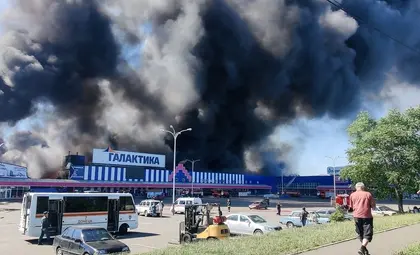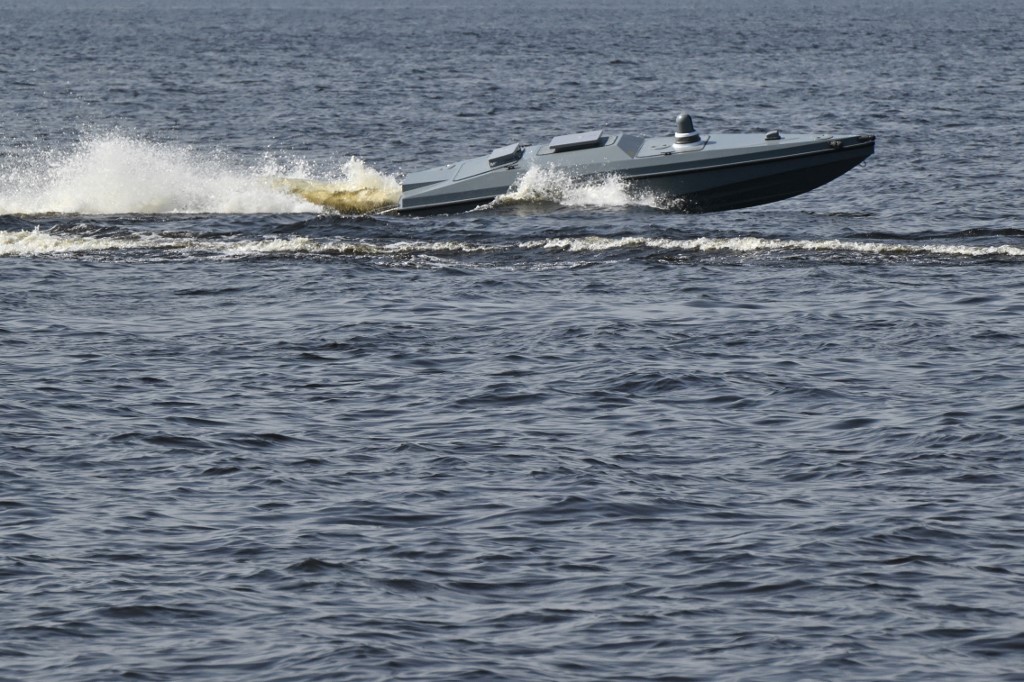Renewed bombardments hit the major Donbas city of Donetsk on August 24. An international watch group suggested a particularly high-profile strike may have been a false-flag, with Russian or Russia-allied troops shooting at the civilians they were supposed to defend.
The Wednesday morning shell strikes hit in the vicinity of Donetsk’s Galaktika shopping center, in the Shiroky micro district. Donetsk is the “capital” of the so-called “Donetsk People’s Republic” (“DPR”), a region bordering Russia that purportedly declared independence from Ukraine in 2014. Local authorities blamed Ukrainian forces for the attack.
JOIN US ON TELEGRAM
Follow our coverage of the war on the @Kyivpost_official.
Aside from Russia and Moscow-friendly states such as North Korea and Syria, no country has recognized the “DPR”’s independence. Russian troops have occupied the territory for eight years. Until 2014, the Galaktika center had been owned and operated by Ukraine’s Epicentr corporation – a company specializing in super stores for home goods and construction materials.
Social media images from the scene showed a fire burning and thick smoke billowing out of the shopping center. Interior images showed smashed windows and collapsed roof tiles. There were no early confirmed reports of victims, while unconfirmed social media messages reported as many as four persons killed.
The fire had been burning for at least three hours, and was increasing in intensity by 11 a.m. Kyiv time, according to multiple reports. Some reports identified U.S.-made 155mm howitzer shells as responsible for the strike.

Russia Is Losing the War in Ukraine: Former Trump Insider Speaks Out
Since the beginning of Russia’s full-scale assault on Ukraine exactly six months ago, the “DPR” has served as a key supply source for Russian troops attacking westward. Ukrainian artillery attacks against “DPR” targets were limited until June, following deliveries of primarily American long-range weapons to the Ukraine Armed Forces (UAF).
Blast at Donetsk main administration building
A very high-profile bombardment, heavily covered by Donetsk-based media and information platforms, blasted the Donetsk main administration building on Aug. 22. According to “DPR” officially controlled media, as many as six U.S.-made HIMARS artillery rockets hit in and around the building in the center of the city.
The UAF had been attempting to assassinate “DPR” strongman leader Denis Pushilin, and members of a Russian parliament delegation visiting at the time, “DPR” officials claimed.
In a video statement recorded on Aug. 23 in front of the badly damaged administration building, Pushilin claimed he had been the target of an assassination attempt and said Ukraine’s “criminal regime uses terrorist tactics to blow up people and civilian infrastructure, and they bombard the center of the city, which is exactly what happened today.”
Over the past six months, UAF artillerymen have generally tried to avoid attacking civilian homes and businesses – focusing on Russian-controlled command centers and senior officials. There was no early UAF official statement on the Aug.23 Donetsk strike.
The Washington-based Institute for the Study of War (ISW) on Aug. 23 said that the Donetsk strike was most likely fired by “DPR” or Russian artillery: “Russian officials may have conducted a false flag event in Donetsk City on Aug. 23 to justify attacks against Ukrainian government buildings on Aug. 24, Ukrainian Independence Day,” the ISW statement said in part.
The Kremlin in late April launched a large-scale conventional troop attack on Donbas territory controlled by the UAF, but by late June the assaults had ground to a bloody halt in the face of fierce UAF infantry defenses backed by increasingly powerful UAF artillery.
Russian occupation authorities responded, in part, with a hard-nosed campaign to recruit residents of the “DPR” to fight against the UAF, at times dragooning military-age civilian men off the streets and from workplaces.
Ukrainian military sources have alleged that Russian and “DPR” units fire on civilian targets routinely to stoke public antagonism towards the UAF and improve recruitment numbers. Pushilin and other “DPR” officials have said that claims they would engineer a false-flag artillery strike on “DPR” civilians, for any reason, are absurd.
You can also highlight the text and press Ctrl + Enter






